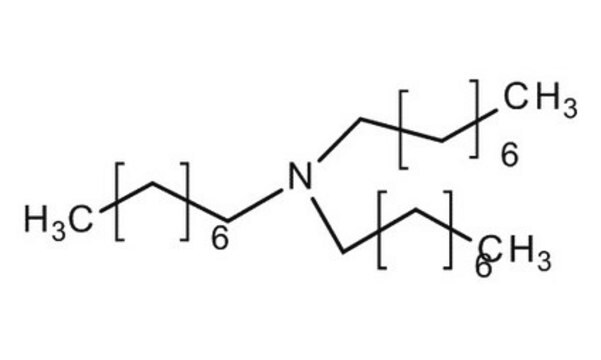O7805
Oleylamine
technical grade, 70%
Synonym(s):
cis-1-Amino-9-octadecene, cis-1-Amino-9-octadecene
About This Item
Recommended Products
grade
technical grade
vapor pressure
8 mmHg ( 135 °C)
Assay
70%
composition
primary amine, >98%
refractive index
n20/D 1.4596 (lit.)
bp
348-350 °C (lit.)
mp
18-26 °C (lit.)
density
0.813 g/mL at 25 °C (lit.)
SMILES string
[H]\C(CCCCCCCC)=C(/[H])CCCCCCCCN
InChI
1S/C18H37N/c1-2-3-4-5-6-7-8-9-10-11-12-13-14-15-16-17-18-19/h9-10H,2-8,11-19H2,1H3/b10-9-
InChI key
QGLWBTPVKHMVHM-KTKRTIGZSA-N
Looking for similar products? Visit Product Comparison Guide
General description
Application
Signal Word
Danger
Hazard Statements
Precautionary Statements
Hazard Classifications
Acute Tox. 4 Oral - Aquatic Acute 1 - Aquatic Chronic 1 - Asp. Tox. 1 - Eye Dam. 1 - Skin Corr. 1B - STOT RE 2 - STOT SE 3
Target Organs
Respiratory system
Storage Class Code
8A - Combustible corrosive hazardous materials
WGK
WGK 3
Flash Point(F)
309.2 °F - closed cup
Flash Point(C)
154 °C - closed cup
Personal Protective Equipment
Choose from one of the most recent versions:
Already Own This Product?
Find documentation for the products that you have recently purchased in the Document Library.
Customers Also Viewed
Articles
Professor Randal Lee (University of Houston, USA) discusses design considerations for iron oxide magnetic nanospheres and nanocubes used for biosensing, including synthetic procedures, size, and shape. The effects of these variables are discussed for various volumetric-based and surface-based detection schemes.
Our team of scientists has experience in all areas of research including Life Science, Material Science, Chemical Synthesis, Chromatography, Analytical and many others.
Contact Technical Service















